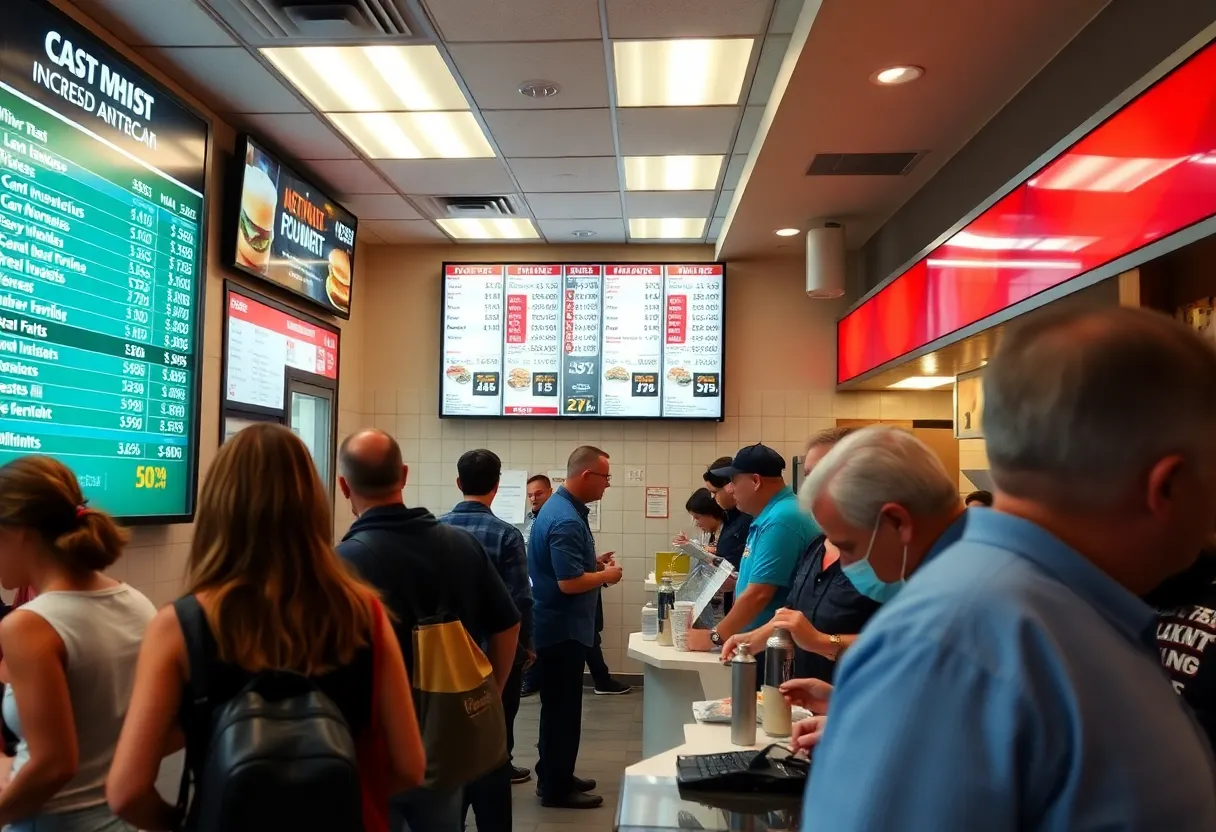News Summary
As of April 2024, California has raised the minimum wage for fast-food employees to $20 per hour, the highest in the U.S. This increase, part of Assembly Bill 1228, is seen as a way to improve the financial stability of workers but has led to debates over its impact on employment and business operations in the fast-food sector. Major franchises have responded by raising menu prices, leading to a decrease in customer spending and operational challenges, raising concerns about job losses within the industry.
California has implemented a significant increase in the minimum wage for fast-food employees, rising from $16 to $20 per hour as of April 2024. This wage is now the highest in the United States. While intended to boost the financial stability of workers, the new law, formally known as Assembly Bill 1228, has sparked debates regarding its impact on employment and business operations within the fast-food industry.
Several major fast-food franchises, including McDonald’s, Subway, Chipotle, and Burger King, have responded to the wage increase by raising menu prices. Many customers have expressed hesitance to dine out, anticipating further price escalations due to the minimum wage hike.
Data compiled from various industry reports reveals contrasting perspectives on the law’s impacts. California trade groups assert that the wage increase has led to significant job losses within the fast-food sector, with reports indicating a 3.1% decline in employment at limited-service restaurants since the wage increase, translating to over 22,600 jobs lost. Conversely, the office of Governor Gavin Newsom maintains that job losses cannot be solely attributed to the wage increase and point to broader economic conditions as factors in the employment decline.
Impact on Business Operations
Mike Keung, who operates seven McDonald’s restaurants in Los Angeles County, noted a range of operational challenges as a direct result of the wage increase. Over the past year, he recorded a 16% reduction in restaurant hours, accompanied by a decrease in his employee roster from 413 to 384, marking approximately a 10% cut in staff. While layoffs have not occurred, hiring has plummeted by over 50%, a stark difference from the 317 employees he hired prior to the wage increase, compared to only 140 individuals post-increase.
Despite these challenges, Keung experienced improved workforce retention, with the employee turnover rate falling from 85% to 40%. This change can be credited to the enhanced wages and benefits attracting and keeping employees longer. Additionally, Keung’s restaurants reported a 40% increase in job applications, with roughly 50 individuals applying daily. The quality of applicants has notably improved, drawing candidates from various backgrounds, including those with teaching experience and individuals seeking supplemental income from other industries.
Business Performance and Economic Context
The overall business environment has not been as favorable, with Keung reporting a 16% decrease in gross sales and customer traffic compared to the previous year. One factor contributing to this decline may be the drop in average customer spending, which decreased by 10% from last year. While value meal promotions have helped somewhat, they have not been sufficient to balance out the financial strains imposed by rising wages and operational costs.
Additionally, Keung’s capacity to contribute to local community efforts through donations and fundraisers has diminished, forcing him to reduce employee benefits and perks within his restaurants. The stark reality is that California’s fast-food workers now earn more than other minimum wage earners in the state, which has inadvertently resulted in reduced work hours for many.
Future Considerations and Legislative Landscape
The establishment of the Fast Food Council by the state allows for annual adjustments to the minimum wage based on inflation, or by 3.5%, prompting discussions among workers who are advocating for a further increase to $20.70 to sustain competitive wages against the rising state minimum. This proposition faces resistance from restaurant owners who are already grappling with operational challenges stemming from the current $20 hourly wage law.
In Southern California, there are approximately 635 franchise restaurants under the management of 90 individual owner-operated families, highlighting that the industry is not solely composed of large corporate entities. As the effects of the minimum wage increase continue to unfold, the future of employment and business operations in California’s fast-food sector remains a critical point of discussion.
Deeper Dive: News & Info About This Topic
- CNN: California Fast Food Wage Hike
- Wikipedia: Minimum Wage in the United States
- KTLA: McDonald’s Owner Discusses Wage Impact
- Google Search: Fast Food Wage Hike California
- The Guardian: California Fast Food Minimum Wage
- Google Scholar: Minimum Wage Impact on Jobs
- Reuters: California Fast Food Minimum Wage Increase
- Encyclopedia Britannica: Minimum Wage
- Santa Monica Daily Press: Minimum Wage Impact Debate
- Google News: California Minimum Wage 2025

Author: STAFF HERE SAN DIEGO WRITER
The SAN DIEGO STAFF WRITER represents the experienced team at HERESanDiego.com, your go-to source for actionable local news and information in San Diego, San Diego County, and beyond. Specializing in "news you can use," we cover essential topics like product reviews for personal and business needs, local business directories, politics, real estate trends, neighborhood insights, and state news affecting the area—with deep expertise drawn from years of dedicated reporting and strong community input, including local press releases and business updates. We deliver top reporting on high-value events such as Comic-Con International, San Diego County Fair, and San Diego Pride Festival. Our coverage extends to key organizations like the San Diego Regional Chamber of Commerce and United Way of San Diego County, plus leading businesses in biotechnology, healthcare, and technology that power the local economy such as Qualcomm, Illumina, and Scripps Health. As part of the broader HERE network, including HEREAnaheim.com, HEREBeverlyHills.com, HERECostaMesa.com, HERECoronado.com, HEREHollywood.com, HEREHuntingtonBeach.com, HERELongBeach.com, HERELosAngeles.com, HEREMissionViejo.com, and HERESantaAna.com, we provide comprehensive, credible insights into California's dynamic landscape.





